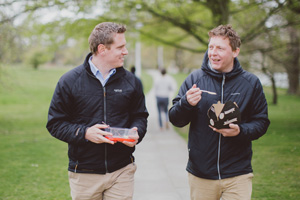Creating a healthy university for all of us
We published our Healthy University Sub-Strategy last year, deliberately focusing on both staff and students, ensuring that we take a whole university approach to well-being. There is a greater emphasis on raising the baseline of well-being, as well as on providing additional services and support for our students and staff.
The Healthy University Sub-Strategy underpins the values set out in the People Supporting Strategy, and promotes a positive concept of health and well-being across three key themes: Mental Well-being, Physical Well-Being andFood and Mood. One year on, here is a short review of some of the actions delivered.
Student actions are being coordinated by Student Life in Academic Section and the Students Union (SU) itself.
The SU has been running one of its largest campaigns this May – around exams. It is a stressful time for many, and the SU has exam angels offering water and fruit immediately prior to exams, and taking a tea/coffee trolley around the library – not only to offer a friendly drink, but the opportunity for a conversation.
A new approach to wellbeing and inclusivity is being developed in consultation with staff with a view to launch from August 2018. The vision for the new service involves greater connectivity between the Students’ Union and the University’s support services, and shared initiatives to support both staff and students. More information about this new service is in the blog by our Head of Student Support, Angela Jones.
Here are a few actions and outcomes to show progress towards becoming a healthier university:
- Some 400 staff and students have now been trained as Mental Health First Aiders (MHFA). There are plans to develop a MHFA Listening Network to provide additional support to our staff and students whilst on campus. In addition, workshops on Building Resilience in Periods of Change are being delivered across the University.
- Healthy University wellbeing sessions are being run on Thursdays 1-2pm in the Hex, including for Mindfulness and Chair-Based Yoga and Movement. These sessions were well attended, with positive feedback from those who had not previously engaged with physical activity/well-being sessions. During this Summer term the focus is on healthy and strong backs, with a workshop being delivered by a local fitness instructor and rehabilitation therapist.
- Stress and Resilience Risk Assessments are being facilitated by the Occupational Health and ER team with each Department and Section. These meetings enable Departments and Sections to identify stressors and determine what actions and control measures can be implemented to reduce or eliminate sources of pressure and to create enabling environments to allow students and staff to flourish.
- Essex Food has created a ‘mindful menu’ available in a number of outlets to encourage healthy eating. This includes the creation of more vegan and vegetarian items on menus.
- Referrals to Occupational Health are being made at a much earlier stage; allowing pro-active interventions to take place when the support is needed, enabling staff to remain in work and return from absence earlier.
- The Well-being Workout programme enables staff members to build on their physical and mental strength during an eight-week course and continues to enhance health and well-being.
- Stair stickers have been installed in the Gateway Building at Southend with motivational messages to encourage individuals to take the stairs instead of the lift.
- Nutritional Talks have been popular with presentations on ‘Healthy Meals’, ‘Hydrate and Feel Great’, ‘Supplements – Scam or Saviour’ and ‘Feed your Brain’. Attendance at these events has been well supported, with feedback that individuals now feel they can make positive changes to their diet following the sessions.
- A number of Healthy University Champions have been trained across the University to assist with the promotion of the Healthy University Sub-Strategy interventions. The continuation and growth of this programme in every Department and Section is taking shape, meeting our aim to increase the knowledge and awareness of the Sub-Strategy.
There are activities that each of us can do to improve our own well-being, as well as the well-being of others. Here are four actions that could help the whole University become a healthier place for living and learning:
- Build more activity into your daily routine: take the stairs instead of the lift, park a bit further away from your place of work, or cycle and walk when you can;
- Use the outdoors for green exercise: take a break at lunchtime to go for a walk, make your next meeting a walking meeting;
- Connecting: visit a café or other public space and spend some time with a colleague or friend; try out one of the new healthier food choices;
- Look out for others: take time out of your day to connect with colleagues.
- I welcome your comments and feedback – please e-mail me at: vc@essex.ac.uk

